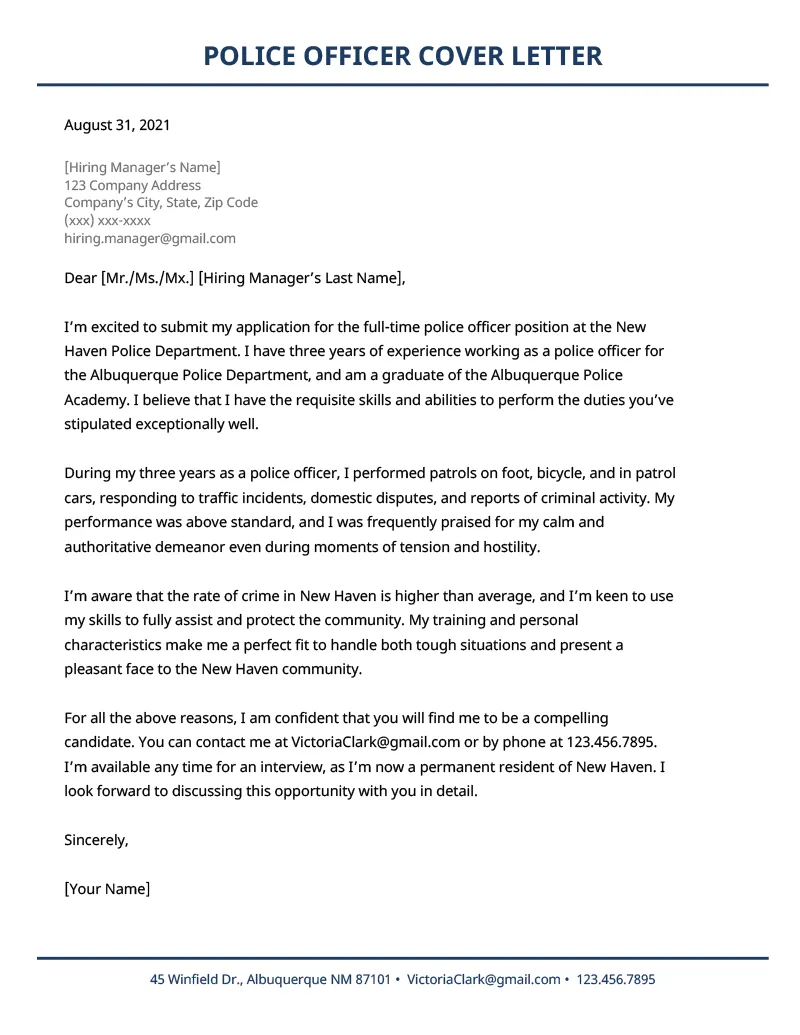What is a Cover Letter and Why is it Important for Law Enforcement?
A cover letter is a crucial document that accompanies your resume when applying for a law enforcement position. It serves as your first introduction to the hiring committee, providing an opportunity to highlight your qualifications, skills, and enthusiasm for the role. In the competitive field of law enforcement, a well-crafted cover letter can significantly increase your chances of being noticed and selected for an interview. Think of it as your personal sales pitch, designed to persuade the hiring manager that you are the ideal candidate for the job. Unlike a resume, which lists your experience and qualifications, a cover letter allows you to provide context, explain your motivations, and demonstrate your understanding of the department’s values and goals. It’s an opportunity to showcase your personality and communication skills, which are essential for success in law enforcement.
Cover Letter Structure for Law Enforcement
A well-structured cover letter is essential to make a positive impression. It should follow a clear and concise format that is easy to read and understand. Begin with a professional header that includes your contact information, the date, and the hiring manager’s information. Next, write a compelling opening that grabs the reader’s attention and states your purpose. The body of the letter should highlight your relevant skills and experiences, providing specific examples to support your claims. In the closing, reiterate your interest in the position and include a call to action, such as requesting an interview. Maintaining a professional tone and using clear, concise language throughout the letter is crucial. Ensure your letter is free of grammatical errors and typos, as these can detract from your credibility. Remember, attention to detail is a key attribute in law enforcement.
Header Information
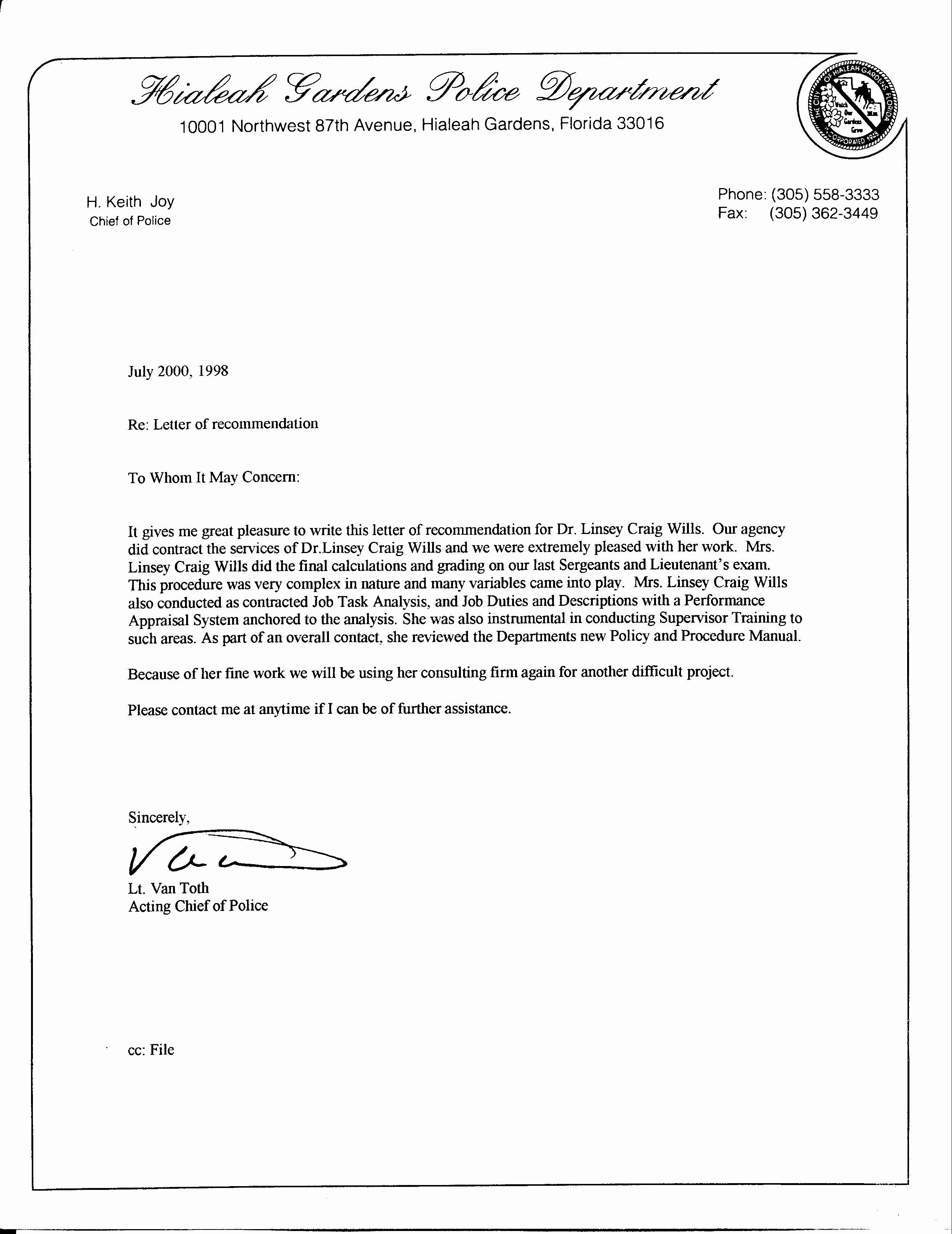
Your header should be at the top of the letter, providing the essential contact details. This typically includes your full name, address, phone number, and email address. It is best practice to use a professional-sounding email address. Following your information, include the date, and then the hiring manager’s name, title, and the department’s address. If you are unsure of the hiring manager’s name, you can research the department’s website or call to inquire. Addressing the letter to a specific person demonstrates that you have taken the time to learn about the department and its staff, which can be viewed positively by the hiring manager. Using the correct formatting and avoiding errors in the header ensures your letter looks professional and organized from the very beginning, setting a positive tone.
Greeting and Opening
The greeting should be formal and respectful. ‘Dear Mr./Ms. [Last Name]’ is a standard and appropriate greeting. Avoid overly casual greetings. The opening paragraph should immediately capture the reader’s attention. State the specific position you are applying for and where you saw the advertisement. Clearly state your intention to apply for the position and briefly mention why you are interested. This should include a brief overview of your key qualifications or what makes you a strong candidate. The opening paragraph is your opportunity to make a strong first impression, so be sure to use clear and concise language. Demonstrating your knowledge of the department and its values from the very beginning can set you apart from other applicants.
Body Paragraphs
The body paragraphs are the heart of your cover letter. Here, you should highlight your relevant skills and experiences, providing specific examples to demonstrate your capabilities. Focus on the skills and experiences that align with the job description, using the STAR method (Situation, Task, Action, Result) to structure your responses. Describe the situation you were in, the task you needed to accomplish, the actions you took, and the results you achieved. This method helps you provide concrete evidence of your abilities. Tailor your letter to the specific requirements of each position. Showcase your knowledge of law enforcement procedures, your ability to work under pressure, your communication skills, and your commitment to integrity and public service. Remember, your goal is to show how your skills and experience make you an ideal candidate for the role.
Highlighting Relevant Skills
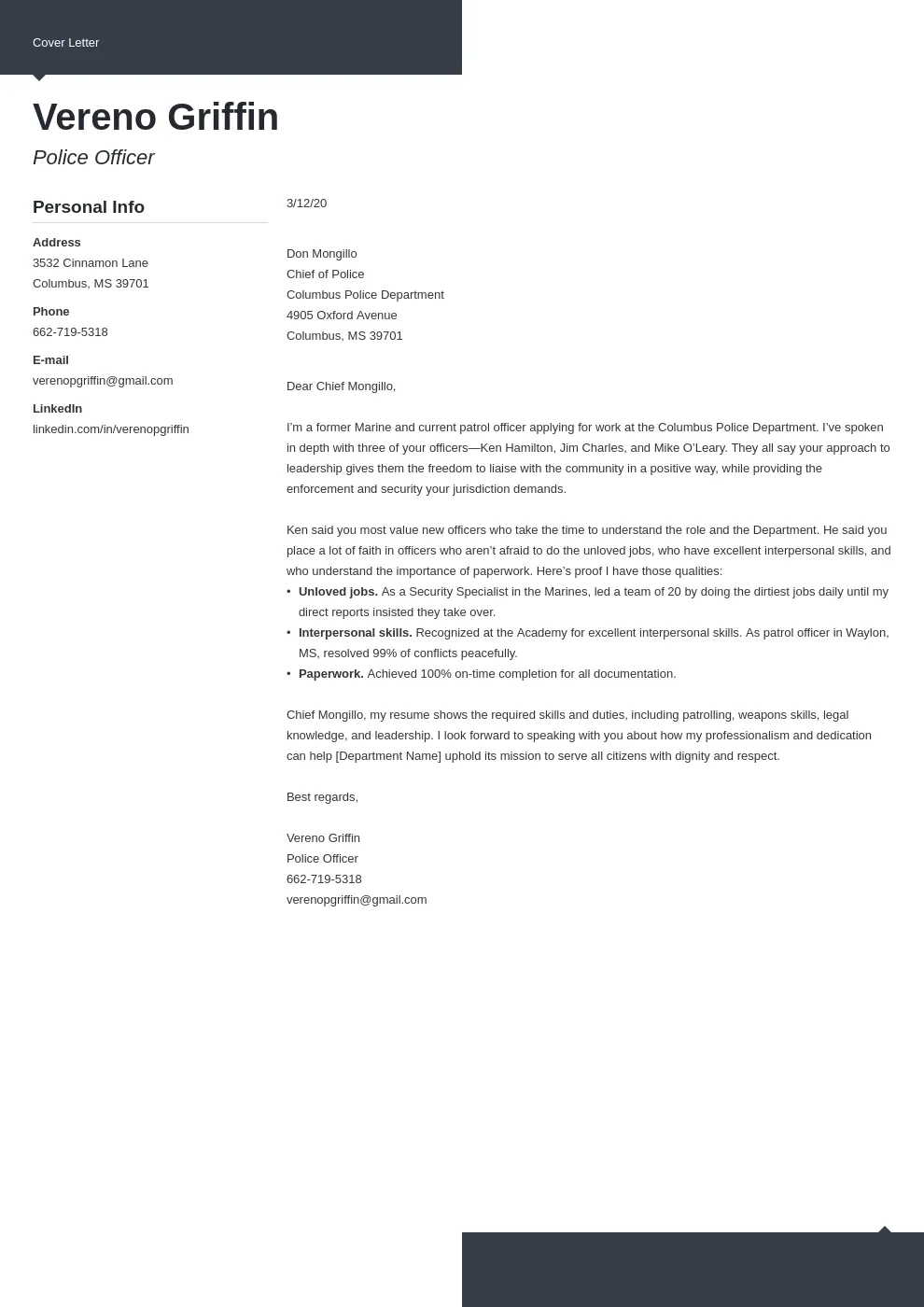
Identify the key skills the department is looking for in a law enforcement officer. These typically include communication, problem-solving, critical thinking, teamwork, and physical fitness. In your cover letter, provide specific examples of how you have demonstrated these skills in previous roles or experiences. For example, if the job description emphasizes communication skills, describe a situation where you successfully de-escalated a tense situation or effectively communicated complex information to a diverse audience. Use action verbs and quantify your accomplishments whenever possible. For example, instead of saying ‘I improved communication skills’, say ‘Improved communication skills resulting in a 15% reduction in citizen complaints’. Highlighting these skills, along with concrete evidence of your ability to use them effectively, will significantly improve your chances of securing an interview.
Demonstrating Your Knowledge of the Force
Showcase your knowledge of the specific law enforcement agency by researching its mission, values, and recent activities. Mention specific programs or initiatives that resonate with you and explain why you are interested in contributing to them. Demonstrate a clear understanding of the challenges and opportunities facing the department and discuss how your skills and experience can help address these issues. Referencing the department’s mission, values, and specific goals will indicate your commitment to the organization and your genuine interest in joining the team. This can be easily researched on the department’s website or through news articles and community reports. Your ability to discuss the department’s priorities and your understanding of its operations will make your application stand out.
Quantifying Your Achievements
Use numbers and data to quantify your accomplishments. Instead of saying ‘I improved efficiency’, say ‘Improved efficiency by 20%, resulting in a cost savings of $X’. Provide specific examples of the positive impact you have made in previous roles. Quantifiable achievements demonstrate your ability to deliver results and provide tangible evidence of your capabilities. This is especially important in law enforcement, where outcomes can often be measured. By using numbers, you provide the hiring manager with concrete evidence of your contributions. This makes your accomplishments more impactful and memorable. Show how you have saved time, money, or improved outcomes. Include data points whenever possible to highlight your contributions.
Closing and Call to Action
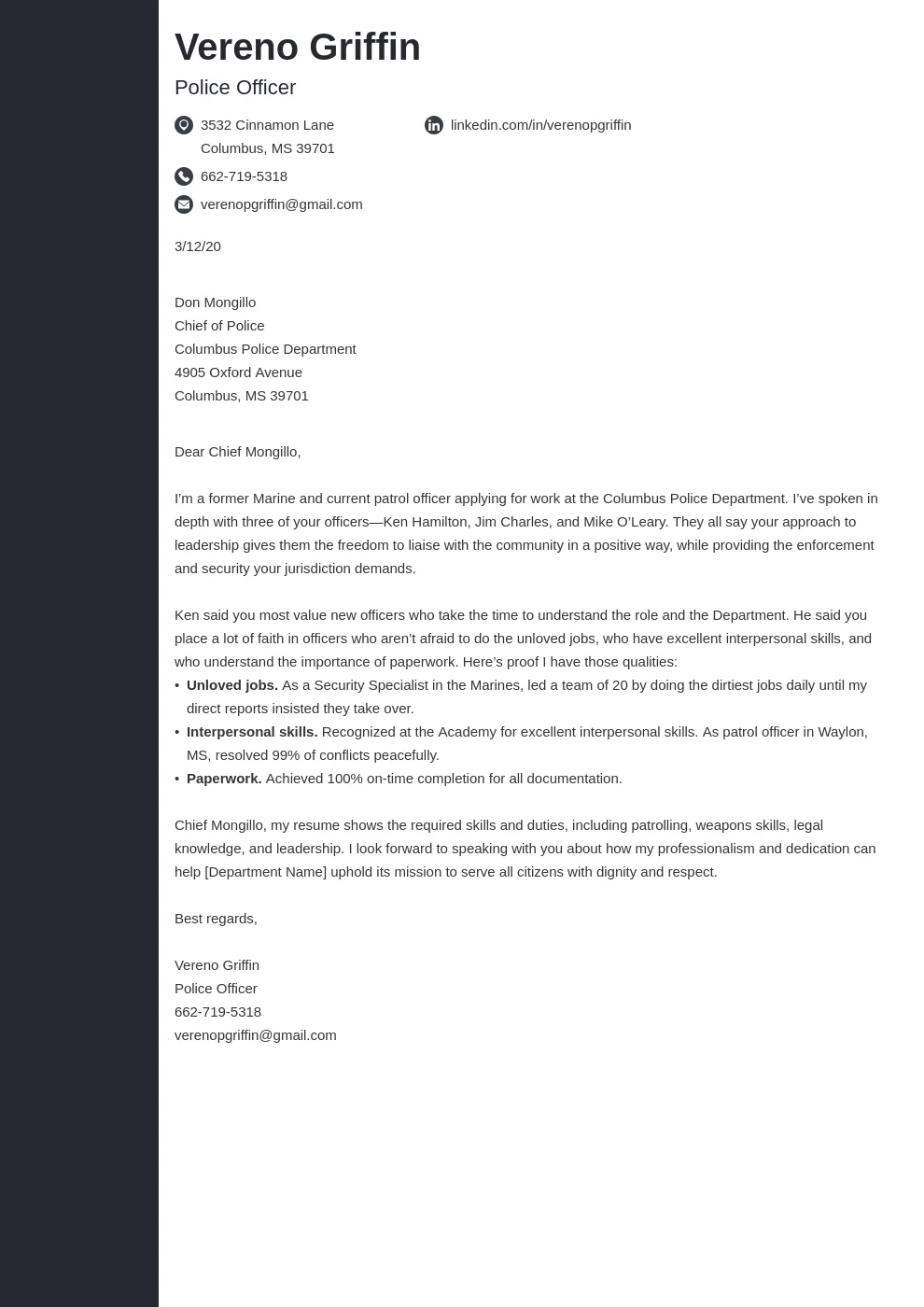
In the closing paragraph, reiterate your interest in the position and thank the hiring manager for their time and consideration. Express your enthusiasm for the opportunity and briefly summarize your key qualifications. Include a call to action, such as requesting an interview or stating your availability for an interview. Ensure you close the letter with a professional closing, such as ‘Sincerely’ or ‘Respectfully’, followed by your typed name. Always review your cover letter before sending it to ensure it is free of any errors or typos. The closing should reinforce your interest and make it easy for the hiring manager to take the next step.
Cover Letter Examples Tailored for Law Enforcement
Reviewing cover letter examples for law enforcement roles can provide valuable insights into the specific language and formatting that is effective. Tailor the examples to your own experiences and the specific requirements of the job. Keep in mind that the examples provide a foundation; personalization is critical. Adjust the examples to reflect your unique skills, experiences, and the specific needs of the law enforcement agency you are applying to. Each law enforcement role and agency will have different needs and priorities. Make sure to highlight the most relevant qualifications, tailoring your letter to showcase your skills and experience as a fit for that department. By doing this, you will greatly improve your chances of making a positive impression.
Entry-Level Cover Letter Example
An entry-level cover letter should highlight relevant skills and experiences, even if they are not directly related to law enforcement. Emphasize skills such as communication, teamwork, problem-solving, and leadership, acquired through education, volunteer work, or previous employment. Highlight any relevant coursework, certifications, or training. Showcase your dedication to public service, your commitment to learning, and your strong work ethic. Demonstrate your understanding of the law enforcement profession and the importance of integrity, ethical conduct, and community engagement. Even without direct experience, highlighting these key attributes can make a strong impression.
Experienced Officer Cover Letter Example
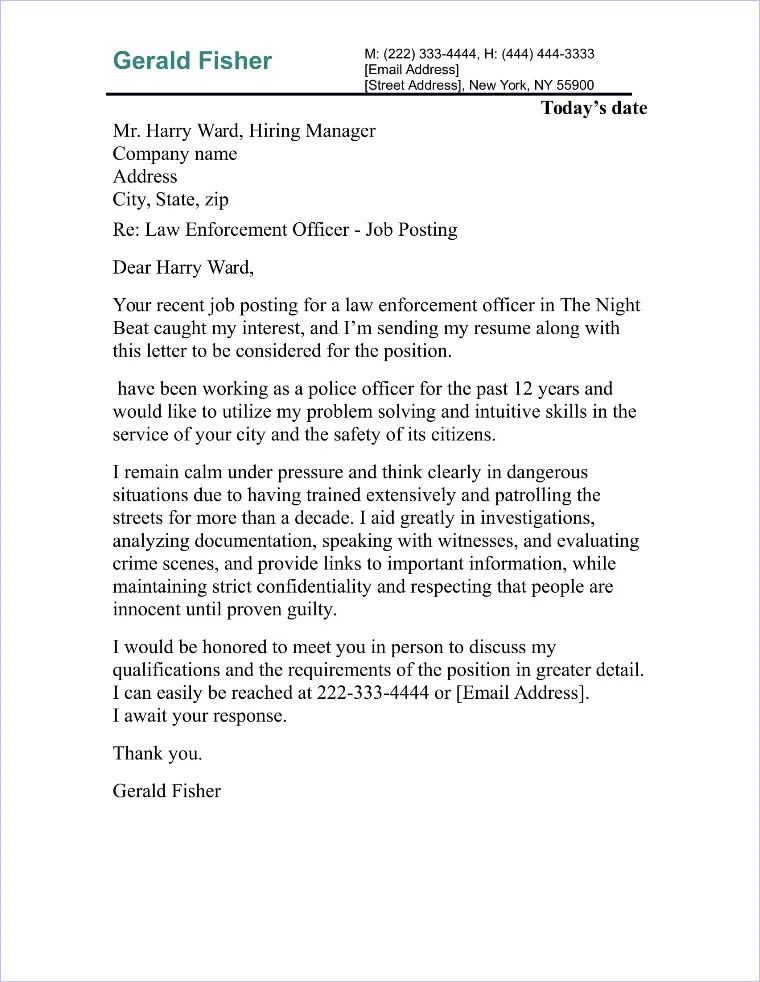
Experienced officers should leverage their past accomplishments and specialized skills in their cover letters. Highlight promotions, awards, and commendations. Provide specific examples of successful investigations, arrests, or community outreach programs. Showcase any specialized training or certifications, such as SWAT, K-9 handling, or forensic investigation. Demonstrate your leadership skills by describing how you mentored or trained other officers. Quantify your achievements by including data points related to arrests, crime reduction, or community engagement. Focus on how your experience can benefit the department and address its current challenges. Your ability to illustrate past successes and bring tangible value to the organization is a significant advantage in the application process.
Tips for Customizing Your Cover Letter
Customizing your cover letter for each position is essential to demonstrating your interest and tailoring your qualifications to the specific requirements of the job. Taking the time to customize your cover letter for each position dramatically increases your chances of making a positive impression and landing an interview. It demonstrates to the hiring manager that you have carefully considered the role and are genuinely interested in the opportunity. Tailoring your cover letter shows that you have taken the time to understand the specific needs of the department and how your skills and experiences align with their requirements. Do not submit a generic letter; always personalize your cover letter to match the specific role and organization.
Research the Department
Before writing your cover letter, thoroughly research the law enforcement agency. Visit the department’s website to learn about its mission, values, recent initiatives, and community engagement programs. Review news articles, social media posts, and other sources to stay up-to-date on the department’s activities. Understanding the department’s priorities will enable you to tailor your cover letter to address their specific needs and demonstrate your genuine interest in joining their team. Mentioning specific programs, initiatives, or goals that resonate with you can further highlight your understanding and enthusiasm.
Tailor the Language
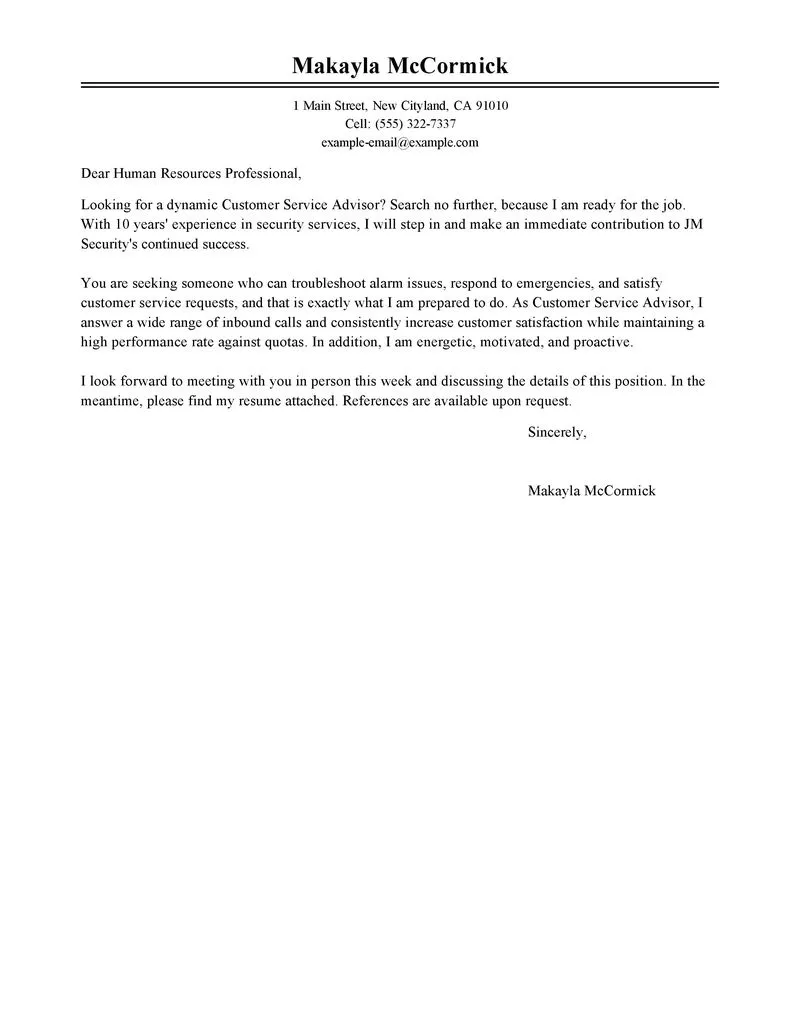
Use the language and terminology used in the job description and on the department’s website. This demonstrates that you have paid attention to the requirements and understand the agency’s priorities. Adapt your language to match the tone and style of the department. If the department emphasizes community policing, highlight your experience in community outreach. If the department values specialized skills, emphasize any training or certifications you possess. Carefully review the job description and identify the key skills and qualities the department is looking for. Then, tailor your cover letter to address those specific requirements, ensuring that you highlight your relevant skills and experiences in a way that resonates with the hiring manager.
Proofread Carefully
Proofread your cover letter multiple times to catch any grammatical errors, typos, or inconsistencies. Ask a friend, family member, or career counselor to review your letter as well. Ensure that your letter is clear, concise, and easy to read. Typos and grammatical errors can damage your credibility and give the impression that you are not detail-oriented. Double-check the spelling of the hiring manager’s name and the department’s name. Ensure your contact information is correct and that you have used the correct formatting. Proofreading your cover letter is critical to ensuring that your application is polished and professional. The attention to detail demonstrated in a well-proofread letter can set you apart from other applicants.
Common Mistakes to Avoid in Law Enforcement Cover Letters
Avoid these common mistakes to ensure your cover letter makes a positive impression and does not hinder your chances of being considered for a law enforcement position. Being mindful of these points will help you avoid pitfalls, enhancing your overall application. A well-crafted cover letter takes time and attention to detail. Careful review and revisions are key to ensuring a polished, professional document.
Generic Language
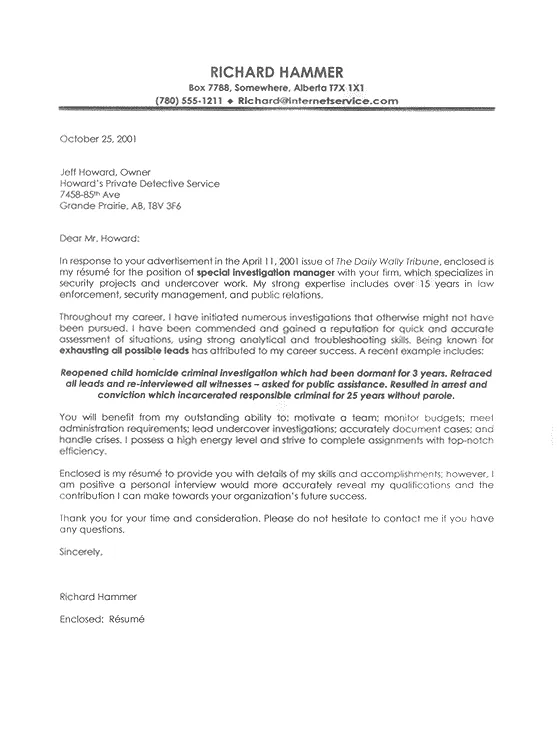
Avoid using generic language that could apply to any job. Customize your letter to highlight your specific skills, experiences, and enthusiasm for the role. Use specific examples and quantify your achievements whenever possible. Generic language can make your cover letter sound uninspired and show a lack of interest in the specific position. Always tailor your cover letter to match the specific job requirements and the department’s mission. Highlight your skills and experiences that directly align with the job description, avoiding vague statements that don’t provide any concrete information about your abilities or qualifications. Make sure your cover letter provides specific insights into your strengths and unique value proposition.
Typos and Grammatical Errors
Typos and grammatical errors can undermine your credibility and make you appear unprofessional. Proofread your cover letter carefully and ask someone else to review it as well. Attention to detail is a critical skill for law enforcement professionals. A cover letter filled with errors suggests that you do not pay attention to detail, which can raise concerns about your ability to perform your duties effectively. Errors create the impression that you are not meticulous or that you did not care enough to carefully prepare your application. Proofreading multiple times is essential to ensure that your letter is polished and professional.
Focusing on What You Want
While it is important to express your interest in the position, avoid focusing solely on what you want from the job. Instead, focus on what you can offer the department and how your skills and experiences can benefit the agency and the community. Your cover letter should highlight your understanding of the agency’s needs and describe how you can help the department achieve its goals. Demonstrating a genuine interest in serving the community is a critical element. Your focus should be on how you can contribute to the team and help the department succeed.
Cover Letter Best Practices for Law Enforcement
To create a compelling cover letter for law enforcement, always prioritize best practices that highlight your qualifications and increase your chances of success. By implementing these strategies, you can create a cover letter that stands out from other applications. Following these guidelines will allow you to make a positive impression, showcasing your qualifications and increasing your chances of getting hired.
Showcase Your Passion
Demonstrate your passion for law enforcement and your commitment to serving the community. Share your reasons for wanting to be a police officer and what motivates you to pursue this career. Expressing your passion for the job is important in law enforcement. Explain why you are interested in law enforcement and why you want to work for that specific department. Share your goals for the future and your commitment to the profession. When it comes to demonstrating your passion, show, don’t just tell, by sharing specific examples of your experiences.
Maintain a Professional Tone
Maintain a professional and respectful tone throughout your cover letter. Use formal language and avoid slang or casual expressions. Law enforcement agencies value professionalism, and your cover letter should reflect that. Always use formal language and avoid any slang or casual expressions. Show respect for the hiring manager and the department, and proofread your letter carefully to ensure that it is free of errors. By adhering to professional standards, you make a favorable first impression, demonstrating respect for the hiring process and the organization itself. Doing this will enhance your chances of making a positive impression.
Highlight Relevant Experience
Focus on the skills and experiences that are relevant to the specific job you are applying for. Highlight any previous experience in law enforcement, security, or a related field. If you do not have direct experience, emphasize transferable skills such as communication, problem-solving, and teamwork. Tailor your cover letter to highlight the specific requirements listed in the job description. Provide concrete examples of how you have demonstrated those skills in the past. Use action verbs to describe your accomplishments. The goal is to demonstrate to the hiring manager that you possess the skills and experience they are looking for in a law enforcement officer.
Follow Up After Submission
After submitting your cover letter and resume, it is appropriate to follow up with the hiring manager or the department. Send a brief email or make a phone call to reiterate your interest in the position and inquire about the status of your application. If appropriate, thank the hiring manager for their time and consideration. Ensure your follow-up is brief and professional. Demonstrate your continued interest and professionalism. Following up shows that you are committed to the process and genuinely interested in the position. Waiting for a reasonable time after applying will demonstrate patience. A polite and professional follow-up can reaffirm your interest in the role and demonstrate your commitment to the department.
